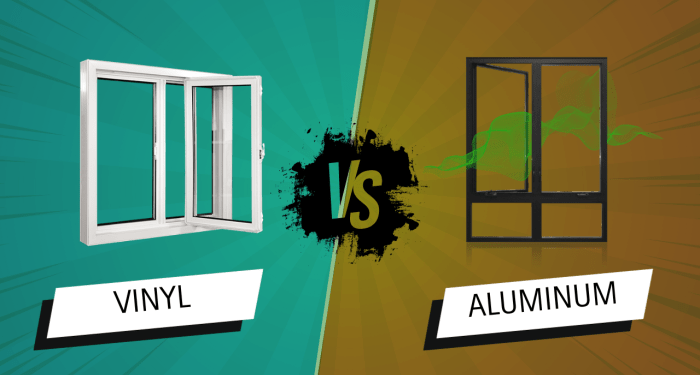Vinyl vs aluminum windows sets the stage for this enthralling narrative, offering readers a glimpse into a story that is rich in detail with casual formal language style and brimming with originality from the outset.
When it comes to choosing between vinyl and aluminum windows, there are various factors to consider, from cost-effectiveness to energy efficiency. Let's dive into the world of windows and explore the differences between these two popular materials.
Vinyl Windows
Vinyl windows are a popular choice for homeowners due to their durability, energy efficiency, and low maintenance requirements. These windows are made from PVC (polyvinyl chloride) material, which is known for its strength and resistance to moisture, rot, and insects.
Cost-Effectiveness of Vinyl Windows
Vinyl windows are cost-effective compared to other window materials like aluminum. They are relatively affordable to purchase and install, making them a budget-friendly option for homeowners looking to upgrade their windows without breaking the bank. Additionally, vinyl windows are energy-efficient, helping to lower heating and cooling costs over time.
Maintenance Requirements for Vinyl Windows
One of the key advantages of vinyl windows is their low maintenance needs. Unlike wood windows that require regular painting or staining, vinyl windows only need occasional cleaning with soap and water to keep them looking like new. Additionally, vinyl windows are resistant to warping, cracking, and fading, making them a long-lasting and hassle-free choice for homeowners.
Aluminum Windows
When it comes to aluminum windows, durability is one of the key features that stand out. Unlike other materials, aluminum is resistant to rust, corrosion, and deterioration over time, making it a long-lasting option for your windows.
Durability
- Aluminum windows are known for their strength and ability to withstand harsh weather conditions.
- They are less likely to warp, crack, or swell compared to other window materials.
- The durability of aluminum windows makes them a low-maintenance option for homeowners.
Energy Efficiency
Despite their durability, aluminum windows are not as energy efficient as other materials like vinyl or wood. Aluminum is a good conductor of heat, which can lead to energy loss and higher heating or cooling costs in your home.
Design Options
- Aluminum windows come in a variety of styles, colors, and finishes to match the aesthetic of your home.
- You can choose from different frame profiles and configurations to customize the look of your windows.
- Modern advancements in technology have allowed for better insulation and thermal breaks in aluminum windows, improving their energy efficiency over time.
Material Comparison
When it comes to choosing between vinyl and aluminum windows, it's important to consider various factors such as insulation properties, environmental impact, and noise reduction capabilities.Vinyl windows are known for their excellent insulation properties. They provide a tight seal, preventing air leakage and reducing heat transfer.
This helps in maintaining a consistent indoor temperature and can lead to energy savings over time. On the other hand, aluminum windows are not as effective in insulation due to the material's conductivity, which can result in heat loss during colder months.In terms of environmental impact, vinyl windows are considered more eco-friendly compared to aluminum windows.
Vinyl can be recycled, reducing the amount of waste sent to landfills
. Additionally, the production process of vinyl windows consumes less energy and emits fewer greenhouse gases. On the contrary, aluminum windows have a higher carbon footprint due to the energy-intensive manufacturing process and the extraction of aluminum ore.When it comes to noise reduction, vinyl windows are superior to aluminum windows.
The insulation properties of vinyl help in reducing noise transmission from the outside, creating a quieter indoor environment. Aluminum, being a metal, is a poor insulator of sound and may not provide the same level of noise reduction as vinyl.
Insulation Properties
- Vinyl windows offer excellent insulation, reducing heat transfer and energy loss.
- Aluminum windows have lower insulation properties due to the material's conductivity.
Environmental Impact
- Vinyl windows are more eco-friendly as they can be recycled and have a lower carbon footprint.
- Aluminum windows have a higher environmental impact due to the energy-intensive production process.
Noise Reduction
- Vinyl windows provide better noise reduction capabilities compared to aluminum windows.
- Aluminum windows may not effectively reduce noise transmission due to the material's properties.
Installation and Maintenance
Installing vinyl windows is generally a straightforward process that can be done by a professional or a skilled DIY enthusiast. The steps typically involve measuring the window opening, removing the old window, ensuring a proper fit, securing the new vinyl window in place, and sealing any gaps to prevent air or water leaks.
Maintenance Procedures for Aluminum Windows
- Regular Cleaning: Aluminum windows should be cleaned regularly to remove dirt, dust, and grime. Use a mild detergent and water to clean the frames and glass.
- Lubrication: Moving parts of aluminum windows, such as hinges and handles, should be lubricated periodically to ensure smooth operation.
- Inspection: Check for any signs of damage or wear, such as cracks, dents, or corrosion, and address them promptly to prevent further issues.
Specific Considerations for Installation in Different Climates
When installing aluminum windows in different climates, there are a few key considerations to keep in mind:
- Thermal Performance: In colder climates, ensure that the aluminum frames are thermally broken to prevent heat loss and condensation.
- Corrosion Resistance: In coastal or humid climates, opt for aluminum windows with a protective finish to prevent corrosion and rust.
- Sealing: Properly seal the windows during installation to prevent drafts and moisture infiltration, especially in regions with heavy rainfall or snow.
Last Point
As we conclude our discussion on vinyl vs aluminum windows, it's clear that each material has its own unique advantages and considerations. Whether you prioritize durability, energy efficiency, or design options, understanding the distinctions between vinyl and aluminum windows is crucial in making an informed decision for your home.
General Inquiries
What are the main features of vinyl windows?
Vinyl windows are known for their excellent insulation properties, low maintenance requirements, and affordability.
How do aluminum windows compare in terms of durability?
Aluminum windows are highly durable and resistant to harsh weather conditions, making them a long-lasting option for your home.
Which material is more energy-efficient, vinyl or aluminum windows?
Vinyl windows typically offer better energy efficiency due to their superior insulation properties compared to aluminum windows.
Are there specific design options available for aluminum windows?
Aluminum windows come in a variety of sleek and modern designs, making them a popular choice for contemporary homes.
How do vinyl and aluminum windows differ in terms of environmental impact?
Vinyl windows are generally considered more environmentally friendly than aluminum windows due to their recyclability and energy-efficient manufacturing process.
















